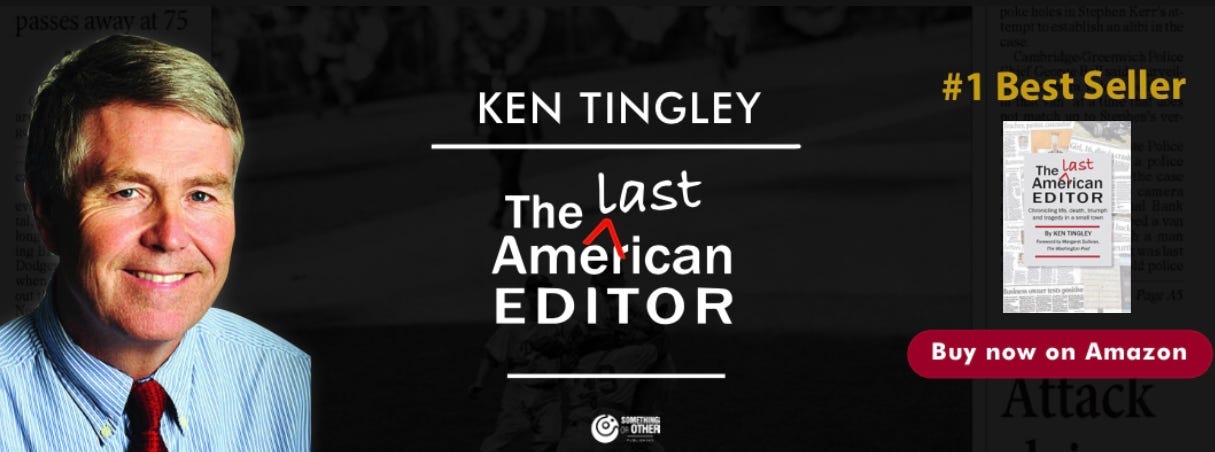The Front Page
Morning Outlook
Friday, February 18, 2022
By Ken Tingley
One of my former colleagues from Lee Enterprises is heading up a non-profit online news organization in Springfield, Missouri.
It’s one of the many possible solutions for keeping local news organizations viable in the future. The goal is for his organization to become financially viable within five years.
In a message to readers, he announced that their news organization would not be writing editorials or endorsing candidates.
I was initially taken back by the strategy.
“But we are committed to going beyond providing you with in-depth news about the issues you care most about. We believe good journalism brings issues to light, but great journalism brings communities together,” he wrote in a message to readers.
As editor of The Post-Star for 21 years, I believed the newspaper needed to have a strong voice to spark community debate on issues. I thought it was important that we also endorse political candidates based on one simple premise - who was the best person for the job.
But considering the political divisions across the country, perhaps this is a needed new direction, especially for a new news organization. Most of all news organizations need to be trusted and if editorials and candidate endorsements erode that confidence then maybe it is time to retire that type of editorial page with use the time to better flush out the issues with more in-depth reporting.
Editorial writing has received a lot of attention this past week as Sarah Palin’s libel suit against the New York Times played out in the court. At issue was a key protection for news organizations. In order to prove libel, public figures have to show the news organization knew what it was printing was untrue and did it with actual malice. It is a high bar to clear.
The Times argued it made a mistake in an editorial about gun control - it corrected it 12 hours later - but the mistake was not intentional.
Over the years as editor of The Post-Star, we received many lawsuit threats, but none ever came to pass. If we made a mistake, we corrected it as quickly as possible after checking with reporters and editors. When doing in-depth stories, we tried to be meticulous in our editing with multiple editors weighing in and the publisher often signing off. But even one poorly chosen word could set up the subject of a story.
The libel protections allowed us to print stories and editorials that were often controversial without the fear of costly frivolous lawsuits. Over the years, our publishers had different comfort levels with controversial stories. If we had been sued, it might have made future important stories impossible to publish.
Considering the financial strain on news organizations today, any erosion of the libel protections could have a chilling affect on local journalism and cost further newsroom jobs. It was what was at stake in Palin vs. New York Times.
The jury found this week that Palin had not proved that the Times had acted “maliciously.” It decided the Times did not recklessly publish something it knew to be false.
There could be further appeals, but for now the libel laws will stay as they are.
It was an important victory for journalism. It was an important victory for local citizens, whether they knew it or not.
Swiss reject supports
Media struggles continue to be a world-wide problem. Earlier this week Swiss voters rejected a government plan to spend over $150 million dollars to help broadcast and print media’s bottom lines. More than half the voters rejected the measure. Opponents of the plan said it was a waste of taxpayer money that would benefit big newspaper chains and hurt journalistic independence. They feared newspapers would be less likely to criticize public officials if they were being subsidized by the government. They may have had a point.
Politics everywhere
Everything is political these days. A recent poll found that Republicans are losing interest in the NFL. The poll found that nearly half of Republicans said their interest as fans had declined in the last five years. Only 25 percent of Democrats said their interest had declined. Perhaps, politics itself has become the new bloodsport for both parties.






Hate to see that happen. Local, independent journalism is so extremely important. What can one do about it?
Ken -- I'd like to see what would happen if a paper ceased identifying office-holders by political party. I'm not sure it's a good idea, but would be an interesting experiment to let public servants stand, or not, on their own merits rather than relying on party affiliation.